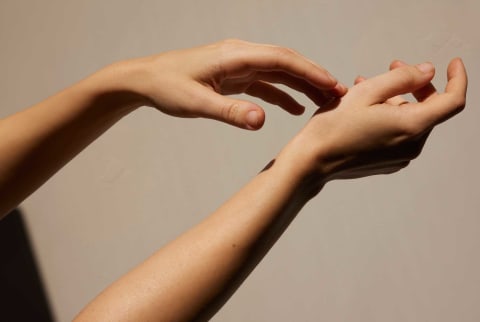Tune In: The Major Ways Social Media Impacts Skin & The Future Of Skin Care

mbg Beauty Director
mbg Beauty Director
Alexandra Engler is the beauty director at mindbodygreen and host of the beauty podcast Clean Beauty School. Previously, she’s held beauty roles at Harper’s Bazaar, Marie Claire, SELF, and Cosmopolitan; her byline has appeared in Esquire, Sports Illustrated, and Allure.com.

Image by mbg Creative / courtesy of source
August 8, 2023
Our editors have independently chosen the products listed on this page. If you purchase something mentioned in this article, we may
We know a few things to be true about modern technology. We know that how we interact with technology impacts our health—be that mental, physical, emotional or even skin health. We know that information can spread like wildfire via social media platforms—and whether that information is honest or misleading is seemingly an afterthought. We know that technology can provide access and accessibility in ways we never thought possible.
We also know that modern technological advancements will only continue to escalate, so it’s important we learn how to utilize them in ways that make us happier and healthier. This all brings me to the topic of today’s Clean Beauty School episode, which is all about social media myths, the future of dermatology, and how we can use technology to bring education to the masses.
Advertisement
This ad is displayed using third party content and we do not control its accessibility features.
Beauty can be the trigger to care for yourself in other ways
One of the things I love most about beauty is that it can be a stepping stone to take care of yourself in other ways. That’s because your skin can be (and often is) a reflection of what’s happening internally.
“Skin is an organ, but not just that. It’s also a signaler of things that are going on in your body, right? There are so many things going on in the body that are then represented in the skin, and there’s no way to look at organ systems as individual objects—and that’s a mistake that we probably make in medicine,” says Shah. “For example, If you have gluten intolerance, it can show up as a very itchy rash on your arms. Or your cardiovascular health will affect the skin. That’s why I think a holistic approach is super important.”
It’s also deeply connected to your mental health.
“Something that’s not often talked about is the referral process that happens within dermatology. How you first interact with the healthcare system may not be where you need to end up,” he says. “But a lot of times the skin is the first thing that people see. A conversation around acne could open up to a conversation about mental health, which could lead to a referral to a psychiatrist. And maybe that’s ultimately what you needed all along.”
Access is vital — and technology may be what gets us there.
Skin care, dermatology, and beauty writ large is often viewed as an indulgence. But we really need to open access to information and care for all individuals.
This is where technology and social media can come in handy. “We need to democratize dermatology,” says Maclellan, noting that’s where telemedicine can come in. “It’s about access. And when I say access, that’s not just ‘Oh you have a phone or computer.’ It’s affordability too.”
And social media (when used responsibly) can help spread good information. “I think dermatologists on social media have a very specific role because of the way that we’re trained. We have a mission to, first, do no harm,” he explains. “And that’s where social media can be super valuable. Let’s say you’re seeing 30 patients a day, and you’re telling everybody to wear sunscreen. But you could do one video where you could reach a million people within an hour. You won’t be able to reach that amount of people in one lifetime in a clinic,”
Advertisement
This ad is displayed using third party content and we do not control its accessibility features.
But of course: Don’t do everything you see on social media
This advice is pretty ubiquitous at this point, but it’s worth repeating since we’re on the subject: The internet can be full of misinformation.
“We live in a society where information is vast and information can go viral really quickly—and everyone seems to be a skincare,” says Maclellan, noting that’s why it’s so important to find a trusted professional. “I’m not saying that only board-certified dermatologists can be skin experts—there are brilliant individuals out there who study the skin—but for me, dermatologists are the ones I trust the most with my patients.”
As far as what Shah actually recommends for is millions of followers and even IRL patients? “My guiding light is if I wouldn’t recommend it to my mom, I wouldn’t recommend it to my patients or followers on social media,” he says. “It could come down to a lot of factors: The price, ingredients, accessibility. All of those things are going to play a factor for me. And that helps me sleep at night.”
Tune in to hear more:
Advertisement
This ad is displayed using third party content and we do not control its accessibility features.








